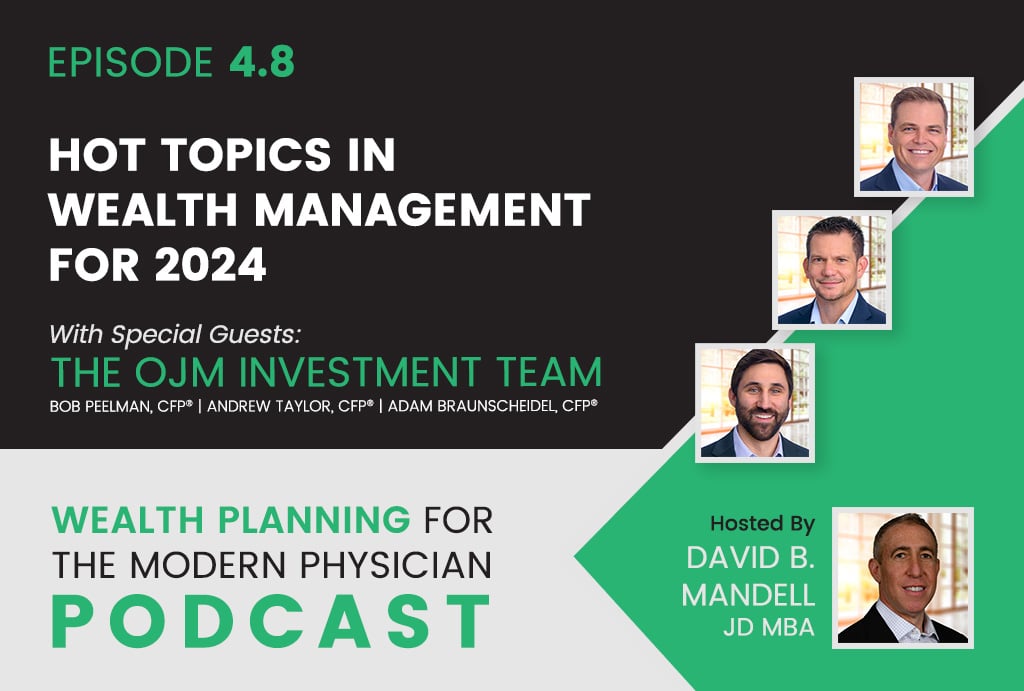Listen in as host David Mandell chats with Certified Financial Planners Bob Peelman, Adam Braunscheidel, and Andrew Taylor from the OJM Group on three important wealth planning topics that are relevant for 2024. Together they share insights on 529 plans, Health Savings Accounts (HSA), and comparing pros and cons versus investing in bonds or holding onto cash.

David begins by discussing with Bob Peelman the basics of 529 plans, including the two types of plans, tax benefits, planning flexibility factors and more. Bob also delves into the new rules coming into effect in 2024 regarding the Roth IRA transfer provisions for unused 529 plan balances.
David then turns to Adam Braunscheidel to discuss HSAs. He explains the importance of having a High Deductible Health Plan (HDHP) to qualify for an HSA and the potential of HSAs as a retirement savings vehicle, taking advantage of their unique triple tax benefit. Adam discusses the tactic of using HSAs for long-term savings by paying current medical expenses out-of-pocket and reimbursing oneself later from the HSA through tax-free distributions.
Finally, David chats with Andy Taylor about the question of whether to invest in bonds or hold cash, particularly in the context of recent interest rate fluctuations and inflation rates. Andy explains the inverse relationship between interest rates and bond prices, and how this impacts investment decisions and how the environment as they record the podcast (4th Quarter 2023) is much different than it was 6, 12, or 18 months ago.
Key Takeaways
Takeaway 1: 529 Plans Still Remain a Preferred Option for Education Savings
To save for the increasing costs of education, 529 plans still dominate as the preferred vehicle. The panelists agreed on the multiple benefits of these plans, which have not only remained popular for a long time but have recently gained increased flexibility, adding to their appeal.
Bob Peelman highlighted the key features of 529 plans, noting that they are “state-sponsored tax-advantage savings accounts designed to help families or individuals save for future education expenses.” He further explained that, while the contributions to 529 plans are not federally tax-deductible, the earnings grow tax-free as long as they are used for qualified education expenses and some states allow a state tax deduction.
Peelman also emphasized the flexibility of these plans, especially in light of recent changes to allow surplus balances to be transferred into Roth IRAs in certain circumstances.
Takeaway 2: Health Savings Accounts (HSAs) Provide Triple Tax Advantage
Adam Braunscheidel explained that an HSA is a tool that allows you to save money for health expenses beyond what your medical plan reimburses.
According to Braunscheidel, HSAs are the “only account vehicle that we have in this country that’s triple tax-advantaged. You get a deduction to put the money in, the funds grow tax deferred, tax-free, they come out tax-free as long as you use them for qualified medical expenses.” He further noted that these accounts offer the flexibility of what counts as medical expenses and easy access to the funds.
Braunscheidel also highlighted the possibility of using HSAs as a retirement savings vehicle. “It’s another way to really put money towards an after-tax account,” he said, suggesting that it might be more profitable to fund these HSAs before other types of retirement accounts because of the tax deduction.
See also: The Different Types of Wealth Management (and Why They Matter)
Takeaway 3: Bonds vs. Cash: Looking Forward, Not Backward
The question of whether to invest in bonds or cash is one that many investors grapple with. The panelists emphasized that while past performance is important to understand, investment decisions should be based on anticipated future conditions. Andy Taylor explained that interest rates play a critical role in this decision-making process.
Taylor explained the inverse relationship between interest rates and bond prices, “So as rates rise, bond prices fall. When the opposite happens and interest rates decline, it’s very, very favorable for fixed income.” He also noted that if interest rates fall, not only do bond prices increase, but the yields on money markets are likely to decline more quickly than bond yields.
Taylor advised against adopting an all-in or all-out strategy when it comes to bonds. He suggested a balanced approach, stating, “Like anything in life and any proper investment strategy, you want a balance between the two.”
Insights surfaced
- 529 plans are considered the best vehicle for education savings, with increasing flexibility allowing for more distribution options.
- The recent rule allowing a maximum of $35,000 to be rolled over from a 529 plan to a beneficiary’s Roth IRA offers a workaround for balances that aren’t used for educational purposes
- Health Savings Accounts (HSAs) can serve as an effective retirement savings vehicle, offering triple tax advantages.
- The performance of bonds versus cash depends on the movement of interest rates. In a falling interest rate environment, bonds could outperform cash.
- Inflation and interest rates are key factors influencing the performance of bonds and cash.

